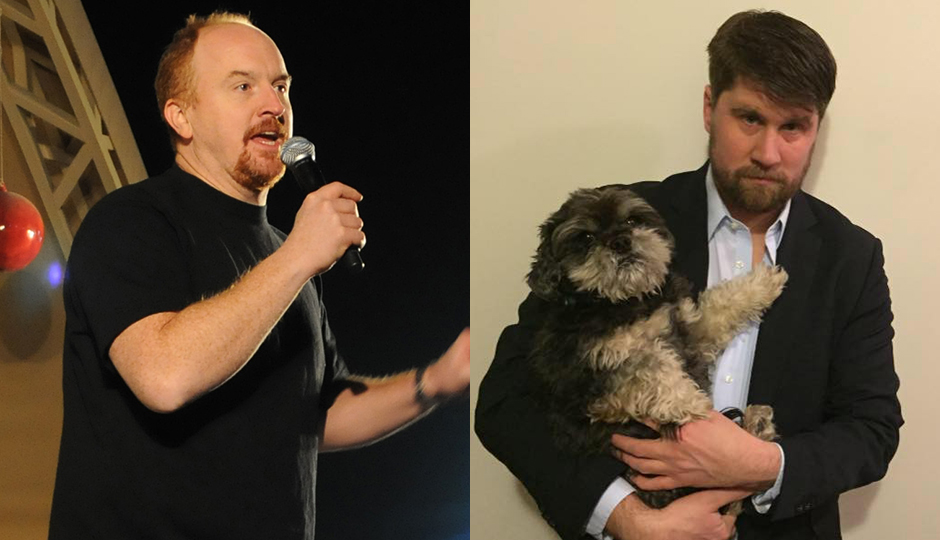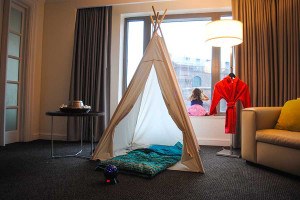Chip Chantry on Opening for Louis C.K. at Helium

Chip Chantry (right, with his dog) opened for Louis C.K. on Tuesday night at Helium.
Chip Chantry is having one hell of a week.
On Sunday, he proposed to his longtime girlfriend. She said yes. On Tuesday, he got a call in the afternoon — about an hour before Louis C.K.’s surprise show would been announced — that he would be opening for the star of Louie. It was just a two-man show, so he got to do a 20-minute set before Louis C.K. Chantry will open for Louis C.K. again tonight at another show where C.K. tries out new material.
Chantry grew up in the Philadelphia suburbs and has been a fixture of the Philadelphia comedy scene almost since he started doing stand-up more than a decade ago. He won the 2013 Philly’s Phunniest contest at Helium, and tours around the country. He’s also one of my favorite comedians. I chatted with him about opening with Louis C.K., crowds in Philly versus crowds on the West Coast, how he got his start in stand-up and his own process of trying out new material.
How did you come to open for Louis C.K.?
It literally happened at noon yesterday when I got a phone call from the owner. I had heard about [a surprise] show, but I didn’t know it was going to be him. I know the owner, so when we were talking I said, “Hey, if you need an opener, let me know.” And he called me yesterday at noon so I had about eight hours to prepare myself. It was just a two-man show, which was nice.
What is it like going on before a comedian like Louis C.K.?
I tried not to put too much weight into it. Because once you’re on stage you’re just doing your set. So that’s what I try to focus on. But of course you can’t do that. So you try to stop your head from spinning and realize, okay, this is what I’m doing. This is the job.
You also remember, too, that — you have these delusions of grandeur for a little bit. You’ll be like, “This is my big break!” But at the same time you have to realize there’s 300 people in the room, and they’re all there to see Louis C.K. I said this on stage last night: I’m literally the only thing standing in the way between them and Louis C.K. So they just have to tolerate me for 20 minutes. You go in with that, so you just have to set the bar low and you know your place. You say all right, I’m just going to try to go get some laughs and warm it up.
What was it like? Did you talk with him at all?
It’s a very intimate green room at Helium. I didn’t see him until I brought him on stage, though. So he had come in during my set, so I literally announced his name and he came from the green room. It was the first time I’d seen him. He was wearing a suit. And then we talked in the green room for a little bit … we got to talk shop for about 15-20 minutes.
This is probably a silly question, but are you a fan? Had you seen Louis C.K. live before?
Yeah. I mean, obviously I’ve seen his show. I’ve seen all his specials. I saw him in Philly a couple of years ago, I think it was at the Merriam Theater. [It was! He played there in January 2013.] He just killed it. I’ve never met him, never worked with him. It was great to see him in a comedy club environment, which is so different from a theater. They’re totally different animals. Just that intimacy is so different. It even said it on the tickets as it was announced: He’s just working out material. So you get to see the process, and maybe not the finished product, but how it’s working out.
Although his “process” is a thousand times more polished than anything that most comedians that I know do. He’s just working on it, but it was already brilliant.
Is that even more interesting to see a comedian in the process of working on his jokes?
Absolutely. Like if I’m seeing him now and he’s working up to a special in a couple of months. To see it then, and to see it there is a really neat process. And everything’s so fresh and new when you’re working on something like that. You build things.
Obviously, I just did two shows with him. But it’s also neat to see when I’m working with another comedian, especially a big time headliner, if we’re doing a week of shows at a club. It’s interesting to see them go through the process of, “I have this new bit on Wednesday.” And they’re kind of working on it, stumbling on it, they tweak it a little bit Thursday, Friday, and then by Saturday it’s a totally different thing and it’s on his feet.
How was the crowd last night?
They’re all there to see Louis, but they’re all there to see comedy. A lot of them stood in line yesterday for three hours to get tickets. If you’re going to stand in line for three hours to get tickets, you’re probably a comedy fan and you’re invested and you’re ready to go. The crowds were great, and they were really cool to me, and I had a lot of fun on stage. They were just crazy for Louie, and rightfully so because he was just so funny.
How did you feel when it was over?
It didn’t really sink in right away until I was on the walk home. While you’re there, you just try to treat it like another day at the office. It’s just another show. It’s what you’re doing. But at the same time, you’re opening for Louis C.K. So it’s a big deal.
When you open for somebody, like last night, after you’re done, do you then watch his set?
The room was packed. So I just kind of hide in the back and watch. And it was amazing. If you’re working with somebody for a whole week, you might not watch every set. But he’s obviously somebody who I didn’t want to miss a minute of it. So you go and you watch.
This wasn’t the first time you’ve opened for a big name. You opened for Dave Chappelle in Portland, and you’ve opened for Bob Saget multiple times. How did those come about?
That [Chappelle gig] was lucky and I just fell totally backwards into it. I was supposed to be working with another comedian out in Portland that weekend and then Chappelle just called when he was working on the shows for Radio City Music Hall. Again, he was working stuff out. So he called the club, and wanted to do it, so they switched schedules with the other headliner and they brought Chappelle in. I fell into it, and it was last minute. I found out Tuesday night that on Thursday I’d be doing six shows with Dave Chappelle.
Bob Saget was somebody who I’d worked with in Portland, too. I did the Borgata with him, I did the Warner Theatre down in Washington, we did Bethlehem Sands. So we work a lot together. It’s been great.
What are comedy crowds in Philly like versus other parts of the country?
Each city kind of has its own personality. It’s definitely a learning process. First, there’s a difference in doing a theater and a club. I love theaters because everybody’s sitting in the dark, they’re facing forward, generally they paid good money to see the show. And you walk out on stage and they’re ready to go. With a club, it’s more intimate. You’re literally a foot away from the front row. And there’s people moving around a bit. There’s a little bit more give and take.
From city to city, it differs. Atlantic City’s interesting because every show has a different crowd. Usually those are theater shows. Then you go out on the west coast and it’s a totally different world out there. You obviously know the Philly attitude: When they love you, they love you; when they don’t, they don’t. We don’t hide things. I can have great shows in Philly, but if they don’t like it — they don’t like it.
You go to the West Coast, and it’s different. My first week in Portland was a real learning experience. Philly, you gotta go and get laughs right away or they don’t want to have it. So you kick ’em right in the teeth right away. I tried to do that in Portland, and they’re not ready for that. They’re so pleasant and patient and they want to listen. I can just kind of tell them a story up front and have them get to know me. And then you can hit them with the jokes.
I do material in Philadelphia that the crowds might kind of get offended by out there. And I’m not a dirty or offensive comedian by most standards. But Portland, Seattle, L.A., they’re very giving crowds but they’re also very compassionate. So if I make a joke about something that’s a little darker, it might get a big laugh in Philly but out there they might be a little more sensitive.
How did you get into comedy and stand-up?
I always loved it. Growing up, my friends would be watching cartoons and I’d be watching MTV’s Half Hour Comedy Hour. That was my go-to. And I would record them. I still have VHS tapes somewhere of just 1989’s finest. I always liked comedy and writing. And then my brother was actually in a band in Philadelphia about 10, 12 years ago. And they would have me open for them.
At Fergie’s was the first time I ever did a set. And they booked me without telling me. They would tell me they wanted me to do stand-up and I was too scared. And then they booked me and told me two weeks ahead of time, “Yeah, you’re doing stand-up at our show.” And that was it.
That’s very 70s, a stand-up comedian before a band.
It usually doesn’t go well. Every once in a while it will. We did a show at Johnny Brenda’s about a year ago. Doogie Horner and I did a show with a great band from Philly called Oldermost. They’re really good. And we did this split comedy/music thing, and I was a little leery going in, and it actually turned out to be a great show. But usually comedy and music don’t mix.
Comedy’s something you can’t spring on a group of people who aren’t ready for it. You have to be ready to go to a show to see comedy. When I would start, it would be an open mic night, and you would just be in a sports bar, and all of a sudden they’d maybe turn the TVs off or put them on mute and go, “Okay, it’s time for comedy!” And you’re not even on a stage. You just have a mic with a little amp, half the time provided by Johnny Goodtimes. It’s just these guys in a bar watching a game or having a conversation or on a date. And then you just spring stand-up comedy on them. That can work for music, if you’re a singer/songwriter, but with comedy people have to seek it out.
How long after you started doing stand-up did you think you could make it a career?
Oh, I still haven’t decided. It’s been 10 years and I’m still not totally on board. My first set at Fergie’s was great. It was my first time ever on stage doing that. But of course it was a lot of friends in the crowd so of course they’re super supportive. And so I think I’m hilarious. Then two weeks later I do another open mic and just bomb my face off. And then you get hit down really hard and think, “Oh, I’m just really terrible.”
For a couple of years, I was really just doing every open mic and doing the Comedy Cabaret in Cherry Hill every Saturday night. This was before Helium was around. I was just doing whatever I could find and wondering if I could make a go of it. About three years ago, I was teaching fourth grade, I took a sabbatical for a year and went on the road and wrote a little bit more and felt pretty good about it. And this past year I just quit the teaching job because I got a writing job at a TV show. And I did that for about eight months — that’s how long the TV show lasted. So now I’m doing this full time and keeping my fingers crossed.
Tell me about the syndicated TV show you worked on, Crazy Talk.
It was a syndicated show for NBC. I was up in Connecticut. I was actually writing at the same studio where they film Maury and Jerry Springer. So it was great. You’d go to lunch and get on the elevator and you’d see the two parties of a Maury paternity test angry at each other and you just want to go get a sandwich.
It was a clip show. We showed reality shows and talk shows — kind of like a Talk Soup type thing. It was a lot of fun. The writers that I worked with were great. It just lasted one season, as these things do sometimes.
I have a story. I went to a show of yours at Helium not long after I started dating the woman I’m still dating now. Before the show, I texted you that it would be the fourth different woman I’d taken on a date to a show of yours over the last 10 years. You wished me good luck. I told you not to worry: My success rate after Chip Chantry shows was 66 percent. You replied: “That’s a better success rate after Chip Chantry shows than I have!”
That night, you basically told that story on stage as a joke. It got a great laugh! When we talked, it didn’t seem like you were trying to set up a bit when we were talking — you were just trying to make me laugh, really. Do you often turn real life conversations into jokes like that?
When I was talking to Louis C.K. last night, he asked how long I was doing comedy and I told him about 10 years. He said, “Ah, that’s nothing.” He meant it in a good way. He said, “Ten years is just when you figure out how to do it.” You figure out the nuts and bolts. And as you go through, you hit 15, 20 years, you really find your voice.
I think my writing process is kind of different. I carry around a notebook. I’m always jotting down ideas. I think for so long I tried to treat my jokes and bits as these precious wonderful, perfectly worded little pieces of art. And that’s such bullshit. But if you say something authentic and real. Just that thing that you told me, and what, an hour later on stage, I went, “My buddy told me this …” And it got a big laugh because it’s real and it’s in the room and it’s authentic. And I was actually talking to the crowd. Authenticity is what makes comedy. The more authentic you are, the more laughs you get.
What do you like about doing stand-up comedy?
I think it’s the instant feedback. As most comedians are, just for my needy nature. “Do you like me? Let me say this and see if you like me.” There’s immediate feedback. If you write an article, you put it out and if it’s in the magazine you have to wait weeks to get it out there. You put it online and see: Is somebody going to say something? Is someone going to comment on it? And I can write a bit, and just go on stage and you find out immediately if it’s great or if it’s terrible. So I love that.
I like to connect with the crowd more. I used to treat it — it was probably a defense mechanism — as an us-versus-them type thing. Me on stage against the audience. Now it’s having a real back and forth with the crowd. It’s just that need to take swings. It’s like going to batting practice. You throw it against the wall and see if it works.
Chip Chantry is opening for Louis C.K. again tonight at Helium. It is already sold out.


